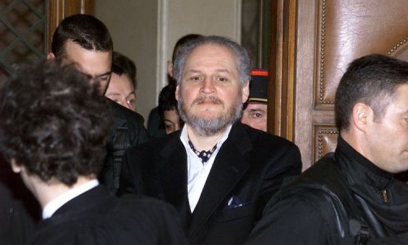The cravat-wearing Marxist-Leninist radical, 62, whose real name is Ilich Ramirez Sanchez, is already serving a life sentence in France for the murder of two French policemen and an informant in 1975.
Ahead of his trial, Carlos boasted in an interview with Venezuelan newspaper El Nacional of committing more than 100 attacks that claimed up to 2,000 lives.
Asked about civilian bystanders who lost their lives in his attacks, he told the paper: “There were very few. I calculated that they were fewer than 10 percent.
“So out of 1,500 – 2,000 killed, there were not more than 200 civilian victims,” he said.
Carlos, born in 1949, rose to prominence in 1975 when his commando group burst into the conference room where ministers from the powerful OPEC oil cartel were meeting in Vienna, taking 11 hostage.
He is now on trial for 1982 and 1983 attacks billed as part of a private war Carlos waged against France to free two comrades, including his future wife, who were arrested in Paris while planning to attack the Kuwaiti embassy.
The first bombing on March 29, 1982 aboard the “Le Capitole” express train running from Paris to the southern city of Toulouse killed five people and wounded 28.
The attack was claimed by the “International Terrorist Friends of Carlos” and was followed by another on April 22, 1982: the Paris car bombing of anti-Syrian newspaper Al-Watan Al-Arabi that killed a passer-by and wounded 60.
The bomb struck on the same day that Carlos’s comrades Bruno Breguet from Switzerland and Magdalena Kopp, who would become Carlos’s wife, were convicted in a French court of the foiled Kuwait embassy attack.
Two final attacks took place on New Year’s Eve 1983, the first targeting a high-speed TGV train travelling from Marseillle to Paris, killing three people and wounding 13.
Moments later, the bombing of a Marseille train station killed two people.
Responsibility for those two attacks was claimed by the “Organisation of Armed Arab Struggle,” in a phone call to AFP.
The prosecution alleges that Carlos also wrote two letters claiming responsibility for the attacks.
Files released from secret police archives in Hungary, former East Germany and Romania following the fall of the Iron Curtain allegedly detail Carlos’ involvement in a series of attacks.
Carlos’ lawyers — including Isabelle Coutant-Peyre, who he married in a Muslim ceremony in prison 10 years ago — maintain that files from the former Soviet bloc are unreliable.
Three other suspected members of Carlos’ gang — “Ali” Kamal al-Issawi, Christa-Margot Froehlich and Johannes Weinrich — are on trial in absentia.
Issawi’s whereabouts are unknown, Froehlich is living in Germany which will not extradite her and Weinrich is serving a life sentence in Germany for other attacks, having been arrested in Yemen in 1995.
After the attacks in France, Carlos moved to Syria where he was allowed to stay until the 1991 Gulf War, during which Damascus was an ally of the United States and so he was asked to leave.
He then sought refuge in Sudan where, after two decades on the run, Carlos was finally captured in Khartoum in 1994 by French secret service agents acting with the help of the Sudanese government.
Carlos and his lawyers maintain that he was kidnapped illegally from Sudan.
Around 20 witnesses are expected to be called at the trial, including family members, experts and former comrades Hans-Joachim Klein and Kopp.
Carlos, who went on a 10-day hunger strike after he was put in solitary confinement for having spoken to the press ahead of the trial, could be given another life sentence.
The trial, ordered by controversial anti-terrorism judge Jean-Louis Bruguiere after an initial investigation in the 1980s, will be presided over by judge Laurent Olivier and is set to last until December 16.









































